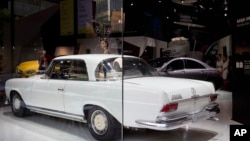Mercedes-Benz issued an apology in China on Tuesday for quoting the Dalai Lama, the Tibetan spiritual leader who is reviled by Beijing, on social media abroad in a reflection of foreign companies' heightened sensitivity to the Communist government's possible reaction to their global activities.
The apology follows official criticism last month of hotel operator Marriott, fashion brand Zara and other companies that were ordered by Chinese regulators to apologize for calling self-ruled Taiwan and Hong Kong countries on websites or promotional material.
The Dalai Lama quote — "Look at situations from all angles, and you will become more open" — appeared Monday on Mercedes's account on Instagram, one of a number of foreign social media services Beijing tries to prevent China's public from seeing. Chinese web surfers with access to technology that allows them to see past the filters copied it onto domestic social media.
In a statement on its Chinese social media account, the unit of Daimler AG did not mention the Dalai Lama but apologized for "wrong information" that "hurt the feelings of Chinese people."
A Daimler spokeswoman in Beijing, Simonette Illi, said the company acted at its own initiative. She said to her knowledge, the company had not heard from Chinese authorities about the quote.
The company statement promised to "take concrete action to deepen our understanding, including colleagues abroad, of Chinese culture and values."
Asked whether that meant Mercedes' global marketing would be designed with official Chinese sentiments in mind, Illi said, "What we are striving for is that, as we are a globally active company, we establish an understanding for cultural tolerance."
Global companies look to China to drive revenue and increasingly design autos, consumer electronics and other products and services sold worldwide to appeal to Chinese consumers.
Beijing rejects accusations of human rights and other abuses as improper interference in its affairs but is increasingly assertive about demanding other governments enforce its political positions in their own countries.
Tibet is especially sensitive for Beijing — one of a handful of "core interests" over which Chinese leaders say they would go to war.
In the case of Marriott, the official Xinhua News Agency cited a company executive as saying an employee abroad who ``liked'' a posting on Twitter citing the Tibet mention would be fired.
Twitter also cannot be seen by Chinese web surfers without technology to evade Beijing's filters, though Xinhua and other official entities use the service to spread the ruling Communist Party's views abroad.
Beijing accuses the Dalai Lama of leading a movement that wants to split Tibet from China. He says he only wants autonomy and to protect the region's distinctive Buddhist culture.
Communist troops invaded the isolated Himalayan territory in 1950. The Dalai Lama fled into exile in India in 1959 following a failed uprising. He stepped down in 2011 as political leader of Tibetan exiles but remained a Buddhist spiritual leader.
In November, a Chinese soccer team that was to play in Germany walked off the field in Mainz after people in the stands unfurled a Tibetan flag.
The Chinese team returned to the field for that match following a 25-minute delay. The rest of their games were suspended after German officials said they could not grant a Chinese demand to prohibit demonstrations.








